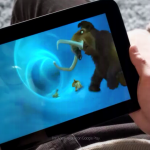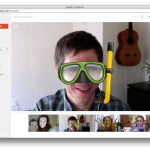The post-PC era already is over

That was fast, if it ever was. Don't blink or the so-called PC era will pass you by. For years, I've called it the cloud-connected device era because of the deeper meaning: Context. But more appropriately, the new epoch is contextual computing, which really extends a transition underway since the World Wide Web opened to the masses about 20 years ago. During the two earlier computing eras, mainframes and PCs, location defined the user. During the contextual computing era, the user defines location. If you listen to analysts obsessed with selling services to enterprises or companies like Apple, post-PC is all about devices. It's anything but.
Context is everything today. I started writing about the concept circa 2004, borrowing from my boss of the day -- Michael Gartenberg. The concept is simple: People are satisfied with what they've got on hand. In context of the airport, a hand-held game console is good enough, while at home the person prefers Xbox and big-screen PC. But because of the cloud connected to an increasing number of mobile devices, context is a much bigger, broader and badder technology trend.
Claim your @icloud.com address

Tonight, my wife received a routine email from Apple. Hey, I didn't get one. But since I declared independence from Apple in July, I really don't care. But you might.
Apple is in process of migrating existing email addresses from @mac.com and @me.com, all of which reflect different iterations of cloud services. I've had mac.com since 2000, or thereabouts. Then four years ago, Apple moved everyone to MobileMe, adding a second domain. Now there's a third supporting iCloud, which debuted about a year ago. This means some Apple users will soon have three different email addresses -- and all of them functional. Confused yet?
Here's what I wrote about Android on its big day four years ago

Searching through my old Microsoft Watch posts for one thing, I found another -- my Sept. 23, 2008 news analysis "How Android hurts Microsoft". I wanted to find some of my past posts about contextual computing, and you can read more about that soon. For today, this story uses the lens of the past to look at the present.
I take lots of flake from commenters, whether directly on posts or blogged by others elsewhere, about my stories. Many accuse me of idiot perspective and being clueless. But often my seemingly brash analyses at the time, peering into future implications, are generally right. If you look at the totality of my writing, there is consistency of thinking that rightly anticipates trends. Abrasive writing style, provocative headlines and forceful argument puts off some people, especially those who don't like change or embracing new ideas. Occasionally I write seemingly contradictory perspectives, trying to look a things dimensionally rather than flatly. The Microsoft Watch post is one example of many that demonstrates what I mean.
Samsung Galaxy S III shipments triple in just three months

Sometimes, we don't agree on what's the best approach to stories. Colleague Mihaita Bamburic and I looked at the same Strategy Analytics numbers but reach different takeaways. He focuses on Samsung Galaxy S III shipments surpassing iPhone 4S during Q3. I latch on to something else: S3 shipments tripling in one quarter.
Samsung started selling S3 internationally on May 29 -- 28 countries to start, with expansion planned to 147 locales from 297 cellular carriers. The smartphone soft launched in the United States on June 21. According to Strategy Analytics, Samsung shipped 5.4 million Galaxy S IIIs during second quarter, more than tripling to 18 million in Q3. That's a helluva change, even for a new product shipping first time into the sales channel.
Microsoft Office for Android and iOS is a Trojan Horse

I simply can't stop laughing about the newest mobile Office rumors. This is better than stand-up comedy because the punchline is just so unbelievable there are seconds of silence before the bellowing roar. Microsoft's idea of a -- imagine my forefingers raised to make mock quotation marks -- mobile Office app is essentially a document viewer. Oh yeah, like I really need one of those, or you.
Yet the rumors make sense, because the approach is oh-so-predictable Microsoft and absolutely what executives should plan. Real Office on either platform is a bad idea. Yeah, just go ahead, make full-blown Office for Android and iOS and feed yourself to the post-PC dogs, leaving behind some mindless, decaying creature from The Walking Dead or your favorite Resident Evil game (or movie). The company's objective is bigger, and actually quite believable: Establish a beachhead for Microsoft account-linked cloud services on competing platforms.
Skype Me! Microsoft retires Messenger

Microsoft CEO Steve Ballmer rarely writes a check this big: $8.5 billion -- that's what he paid for Skype in May 2011. So surely, he will get some value for his money. The communications client is this year's rock star, popping up in more new Microsoft products than American-made cars in Big B's garage. One more triumph remains. Months after removing "Windows Live" from Messenger's name, Microsoft will kill the product, replacing it with Skype. Please, let's pause for a silent moment of respect. Yes, you can shed a tear. I've got a hanky if you need one.
"We will retire Messenger in all countries worldwide in the first quarter of 2013 -- with the exception of mainland China where Messenger will continue to be available", Tony Bates, head of Microsoft's Skype division, says. Cue the violins. Surely Skype for Windows 8, but no Messenger in sight, foreshadowed something. The timing makes sense, following Windows 8's launch and coming around when Microsoft makes Office 2013 available to everyone. The messaging software is essential to both, as well as Windows Phone 8.
Will you buy Google Nexus 4?

In seven days the fourth-generation Nexus smartphone goes on sale at Google Play. The question: Will you buy? Early reviews are in (sorry, we don't have a device yet so you'll have to read elsewhere), and they're quite encouraging. Nexus 4 promises to be one of the best Android smartphones, perhaps the best period, available this holiday season. But better doesn't mean good enough for your budget, and you might be happy with current device or looking at Apple or Microsoft platforms instead.
LG makes the handset, which Google helped design. The search and information giant will sell two models with identical features but different storage capacities -- 8GB ($299) and 16GB ($349), unlocked and no contract commitment -- starting November 13. T-Mobile USA will sell a subsidized model the following day, requiring 2-year service agreement. Nexus 4 features a quad-core processor, doubles typical Android phone memory to 2GB and runs newest Jelly Bean. But unlike its predecessors, the smartphone has a fixed battery. Does that matter to you? It does to me.
Is Apple hiding weak iPad mini sales?

This morning, Apple issued a press release touting 3 million iPad 4 and mini WiFi sales over the first three days (cellular models aren't available yet). Both products went on sale November 2. But that's not the data I waited for. Apple didn't break out iPad mini, which is suspicious. Rumors, and enormous buzz, preceded the launch for most of the year. Hell, I posted a buying poll in February. The first tell: No big, pre-order announcement, which is atypical of a company that seizes every opportunity to boast about sales for marketing advantage. If early numbers were really good, Apple would say so.
By combining the sales of two products, Apple gets headlines across the InterWebs about a big launch that the company claims is twice iPad 3. Marketing value is still big, while avoiding answering question: What about iPad mini? Considering that the smaller tablet opens new pricing and size segments and, by Apple CFO's admission, is a considerably low-margin product that could impact profits, answering the question is quite important. Revealing: In a statement, CEO Tim Cook says Apple "practically sold out of iPad minis".
Apple squanders its riches

Does anyone really like to be bullied? Is arrogance something most people aspire to achieve, or behavior socially embraced? You know the answers. But these qualities too much describe Apple since its sudden success starting in 2010. The company continually sticks a middle finger in the face of competitors, judges, partners, the patent system and pretty much anyone or anything else. The corporate attitude is a disaster underway that, unless checked, will ruin reputation long in the making.
The Cupertino, Calif.-based company makes many of the same mistakes Microsoft did during the late 1990s. Apple's most valuable commodity is its brand, which is being squandered at alarming pace. For a company for which so much stock share value derives from perception, the risk is huge.
You will buy Google Nexus 10

It's an itch you'll want to scratch this holiday. Just give into it.
Preliminary results from our poll "Will you buy Google Nexus 10?" are in, and I'm not satisfied enough with the numbers, being well below 1,000 responses (hence, poll is reposted here). But at this juncture, 36.82 percent say they will buy as soon as the tablet is available -- and that's November 13 in some regions. Another 18.32 percent plan to buy within 3 months. So more than 55 percent plan to get the Nexus 10 before Valentine's Day. Hey, that's two holidays for you to ask for one, with Christmas obviously in-between. Ten percent of respondents are unsure, while 25.86 percent say they won't buy.
Which survives the drop test, iPad mini or Nexus 7?

To be honest, you really don't want to know which one. Some tragedies are simply too painful to see. But if you delight in car crashes, then do watch Darcy LaCouvee plummet the Apple and ASUS/Google tablets to the cement. Informal drop tests like this one aren't exactly scientific, if for no other reason than Chaos theory. But they're nevertheless revealing and entertaining.
Like the iPhone 5 vs Galaxy S III drop test, the Android Authority reporter waited until the Apple device starting selling in stores to drop-test the tablets. He's back again from Hong Kong, in this riveting 5:39 video.
Apple starts selling iPad mini

Today in more than 30 countries, new iPads -- fourth-generaton 9.7-inch and new mini 7.9-inch -- are available for purchase. In-store sales, direct from Apple and third-party retailers follow a week of pre-orders. The Cupertino, Calif.-based company unveiled both tablets on October 23.
iPad 4 is largely unchanged from its predecessor; the biggest difference being the new A6X processor, which Apple claims doubles performance. The mini is a fresh design and smaller physical size that lowers the entry-level price to $329. The company chose to preserve the larger tablet's user experience, including 5MP rear-facing camera, on its smaller sibling. Big difference, other than physical size, is dramatic lowering of screen resolution -- 1024 x 768 on the mini compared to 2048 x 1536 resolution on iPad 4.
Three out of four smartphones ship with Android

Android's ascension over iPhone reached the figurative stratosphere during third quarter, according to IDC. Seventy-five percent of smartphones shipped with the operating system -- that's up from 57.5 percent a year earlier. By comparison, iOS nudged up to 14.9 percent, from 13.8 percent. That's right, little more than 1 percent. There's a reason that in September I asserted "Android wins the smartphone wars". There's certain appropriateness to IDC releasing the data on Day of the Dead.
Out of fairness to Apple, iPhone unit volumes rose considerably more, 57.3 percent, than market share reflects -- 26.9 million units compared to 17.1 million a year earlier. Android shipments rose 91.5 percent; 136 million, compared to 71 million in Q3 2011. Still, Android volumes in the quarter exceeded that for all smartphones in 2007. My how the market has changed.
UK judges order defiant Apple to fix misleading Samsung apology

I wondered whether UK judges would kick in the teeth of arrogant Apple lawyers. They'll need dental work now. Today, the Court of Appeal in London delivered a figurative fist to the face in response to Apple posting a court-ordered apology that was anything but -- and actually accomplishes the opposite of its intent.
In July, UK judge Colin Birss ruled against Apple in a case charging Samsung with copying iPad's design. He ordered Apple to post an apology on its website and in major publications, to help offset the public image damage inflicted on Samsung. The American company appealed and lost. That notice, posted last week, defies the spirit of the order, an appellate judge told Apple lawyers today, according to Bloomberg.
Google Hangouts redesign is about you

If you ever wondered why Microsoft spent $8.5 billion to buy Skype and now tightly integrates the service into new software, Google+ Hangouts is one reason. The search giant has gone far making video group chatting easy, as well broadcasting live streams and posting them to YouTube. Today, Google improves Hangouts, bringing the overall feel in line with other, recent Plus changes. Most importantly, there's more white space, less clutter and clearer notifications. Say, we should Hangout and try it out.
Amit Fulay, Google product manager, explains: "The most important part of a hangout is the people in the room", which aptly describes the redesign's major benefit. Hangouts now consolidates "important items -- like invites, chat, and apps -- into a sidebar that's there when you need it, and tucked away when you don't".
Joe's Bio
Joe Wilcox is BetaNews executive editor. His motto: Change the rules. Joe is a former CNET News staff writer, JupiterResearch senior analyst, and Ziff Davis Enterprise Microsoft Watch editor.
Ethics Statement© 1998-2025 BetaNews, Inc. All Rights Reserved. Privacy Policy - Cookie Policy.
